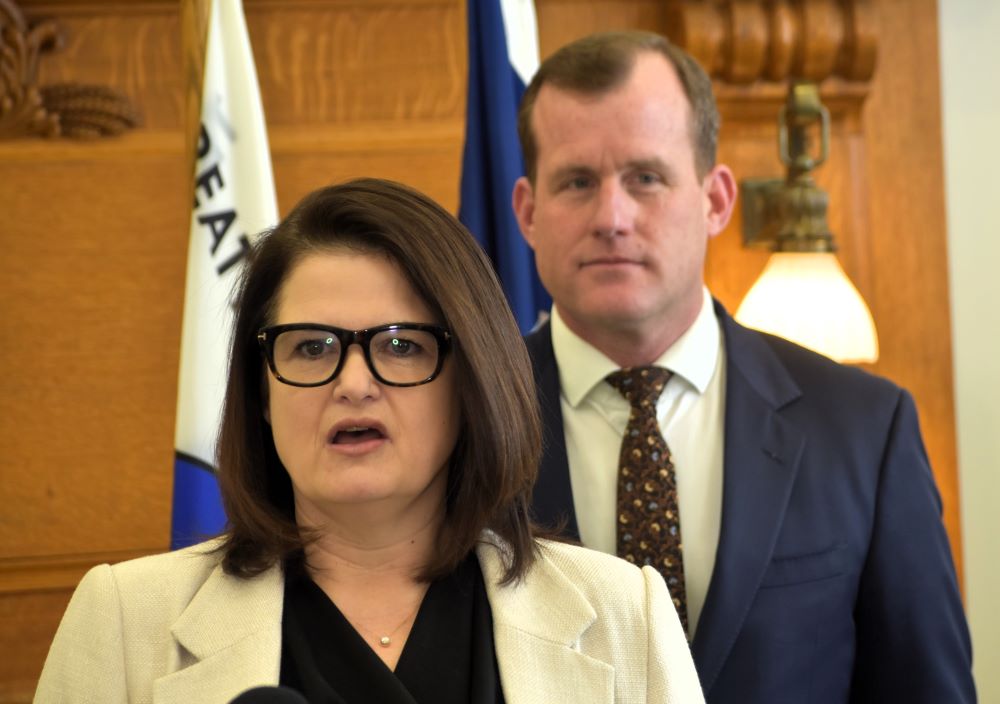
A total of $20.1 billion was invested in this year’s Provincial Budget, with significant investments in education and healthcare leading the way.
Despite the ‘record investments’ highlighted by the provincial government, Official Opposition Leader Carla Beck said the government did nothing to address the biggest issue facing residents in the province. Affordability.
“As families across the province are struggling with higher costs, we see no gas tax relief, no new programs to make life more affordable, and nothing to help with the Sask Party’s increases,” Official Opposition Leader Carla Beck said. “We see not a penny, dime, or dollar to help support the biggest issue facing families across the province.”
Premier Scott Moe pointed to removing the carbon tax on home heating, which is set to save a family of four an estimated $400, as one of the things the province has done to make life more affordable.
“We have the second-lowest utility bundle that you can find in the nation. We have taken initiatives that I’ve spoken of numerous times to remove 112,000 people from the tax rolls. The list goes on. We are reducing the carbon taxation that is on home heating fuel in this province to mirror what the federal government has done largely in Atlantic Canada.”
NDP Finance Critic Trent Wotherspoon said that no new measures to address the cost of living in the province show that this government is either out of touch or couldn’t care less.
“It’s sad, but not a real surprise, that this tired and out-of-touch government brought forward a budget without a single cost-of-living measure,” Wotherspoon stated. “What’s in the budget isn’t a question about politics or curiosity; it’s about whether they need to cut the activities that their child loves or are able to pay their mortgage. It’s real life; it’s a real hardship; it’s survival for some.”
Regarding the record investments, Beck said that she had seen this movie before and did not like the ending.
“This is an election budget. Big promises one year, followed by tax hikes and cuts to services next year,” Beck said. “This is a government that has been in power for 17 years, and we know who they are, and we know their record. The Sask. Party pulled this move back in 2016 when, before the election, they promised the moon and stars, only to pull the rug out with the largest single tax increase in the history of the province and devasting cuts to services that people in this province rely on.”
The Saskatchewan NDP wasn’t the only one disappointed by the budget’s lack of affordability measures, as Gage Haubrich, the prairie director for the Canadian Taxpayers Federation, said this year’s budget means residents will see no relief.
“It’s extremely disappointing to see the government fail to balance the budget again. I was here last year when the Minister stood up and said there was going to be a one-billion-dollar surplus, but now that has turned into a deficit, and now we’re seeing another deficit, and that means consequences for rising debt and interest payments.”
He said the worst consequence isn’t the rising debt but the investment the government would have been able to make if it paid down the debt.
“The most important number is $730 million that we’re spending this year on interest payments. That’s over ten million dollars a month that the government can’t use for tax relief and can’t use to invest in new programs,” he said. “That’s hiring 7,000 teachers this year, hiring 7,000 nurses, but instead, that money is completely wasted.”
Haubrich said that this year’s budget was a missed opportunity for the government to help out its residents.
“Saskatchewan families are hurting right now. They’ve just gone through some years of record inflation. It’s getting harder and harder to make ends meet, so if we would have seen a gas tax cut, it would mean every time drivers go to the pumps, they’re saving that 15 cents a litre,” he said. “It’s kind of perplexing to see why this government wouldn’t move on this because they know how much the federal carbon tax, which does the exact same thing, hurts Saskatchewan families, but yet they continue to charge a gas tax of their own.”
For those living on low incomes, the Ministry of Social Services is increasing its investment to help low-income individuals, families, and seniors provide for their basic needs as they work to become more self-sufficient and independent to the best of their abilities.
A $17.0 million investment will deliver the first full year of the Saskatchewan Employment Incentive program, making life more affordable for working families with lower incomes. Monthly income assistance benefits will rise by three per cent for Saskatchewan Income Support (SIS) and Saskatchewan Assured Income for Disability (SAID) clients, and the Personal Care Home Benefit monthly income threshold will increase by $100 to $2,500 to help make the cost of living in a licensed personal care home more affordable for seniors.
Peter Gilmer, Minister at the Regina Anti-Poverty Ministry, said that while he is happy to see all of those programs receive increased investments, they really won’t help those on low incomes.
“An election budget should be looking at providing something for the widest cross-section of the population, and the reality is that the people that need it the most are getting three per cent,” he said. “If these rates were even halfway adequate, it would be one thing, but three per cent of what are such low rates, to begin with, is nowhere near the need, and ultimately, we’re going to be paying the cost of this further down the road.”
Gilmer also said that the provincial government’s decision not to pay the carbon tax will actually hurt low-income people who rely on the federal government’s carbon rebate.
“If low-income households ultimately lose the rebate, many of those households are actually worse off,” he said. A general theme across the board with this budget is that the lowest-income households are getting the least relief in terms of what’s being announced.”
Gilmer said that, overall, this budget will do very little to offset the inflation pressures that low-income households face.









